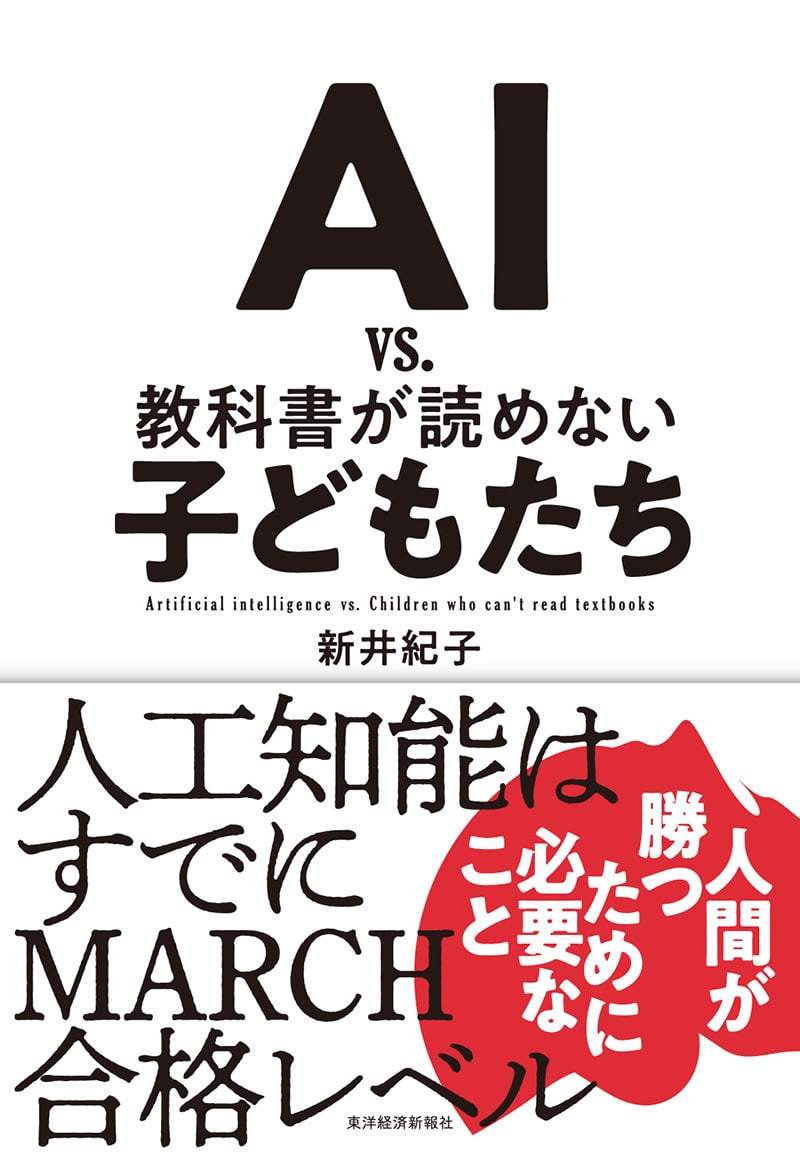Artificial Intelligence vs. Children Who Can't Read Textbooks
The future resulting from the evolution of AI is a nightmare of the worst kind, accompanied by the deterioration of education.
This book shows misconceptions about AI and its limitations and points out the decline in reading comprehension of Japanese people. It has attracted a lot of attention and sold more than 300,000 copies in Japan.
It has won many awards, including the 2019 Business Book Award.
The robot developed by the author could not solve the entrance exam questions of the University of Tokyo, Japan's most difficult university. But "he" passed the entrance exam of famous private universities in Japan!
What does this mean?
What is AI good at, and what is it not good at?
AI optimists envision a future where humans and AI complement each other and coexist.
However, a survey of the reading comprehension of 25,000 people in Japan, conducted at the same time as the AI experiment, revealed a frightening reality.
While the limitations of AI are shown, the future crisis lies in education on the human side. And the result is the worst possible depression. So what can we do to avoid the worst-case scenario?
The author, also an education expert, gives her suggestions.
Click here for inquiries regarding book rights
Overview
Table of Contents
AI and Singularity
His Deviation Value is 57.1
History of AI Evolution
The Impact of YOLO - The Cutting Edge of Image Recognition
Watson's Successes
Todai Robot's Strategy
AI Will Take Our Jobs
Chapter 2: Singularity is Science Fiction
The Wall of Reading Comprehension and Common Sense
AI Cannot Understand Meaning
Is Siri the Wise?
A Strange Piano Piece
Machine Translation
The Singularity Will Never Come
Chapter 3: "Reading Skills Test" for diagnosing reading comprehension
Can Humans Do Jobs AI Can't Do?
Basic Mathematics Survey for College Students
Survey of Basic Reading Skills of 25,000 People Nationwide
One in Three Cannot Read a Simple Text
Deviation Value and Reading Comprehension
Chapter 4: The Worst-Case Scenario
White-Collar Workers Divided by AI
Companies will Disappear
The Coming of the AI Great Depression
Author Profile
Noriko Arai is a professor at the National Institute of Informatics and its director of the Research Center of Community Knowledge.
She is also the president and director of the Institute of Science for Education.
She graduated from Hitotsubashi University, Faculty of Law and the University of Illinois, Department of Mathematics, and withdrew with credit from the Graduate School of Mathematics, University of Illinois, 5-year program. D. from Tokyo Institute of Technology. Her specialty is mathematical logic.
Since 2011, she has been directing an AI project, "Can an AI pass the entrance exams of the University of Tokyo?". She has led the research and development of the "Reading Skills Test" for diagnosing reading comprehension since 2016. Her major publications are: "Arithmetic for a Happy Life" and "Introduction to Mathematics for Survival" (East Press), "Mathematics is a Language" (Tokyo Shobo), and "Computers Take Our Jobs" (Nihon Keizai Shimbun Publishing, Inc.).
In 2018, she received the 66th Japan Essayists Club Award for this book.
(Information is current at the time of publishing.)

